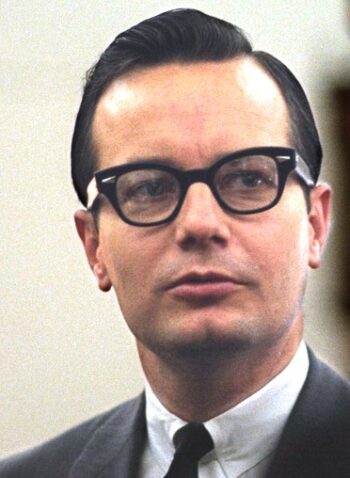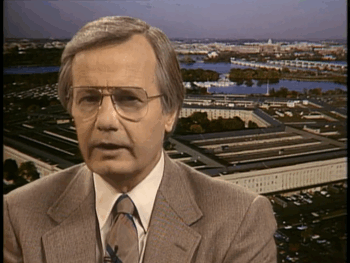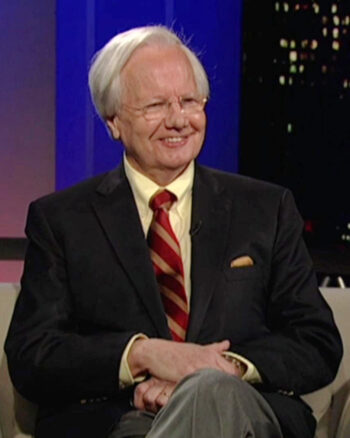
White House press secretary Bill Moyers in 1965.
Bill Moyers died last week at the age of 91. His career began as a close aide to President Lyndon B. Johnson, serving as LBJ’s de facto chief of staff and then his press secretary, but Moyers spent most of his life in journalism. After the Johnson administration, he was briefly publisher of Long Island’s Newsday, which won two Pulitzers under his tenure before he was forced out for being too left (Extra!, 1–2/96).
Most of Moyers’ journalism, however, appeared on public television, an institution he helped launch as a member of the 1967 Carnegie Commission, which called for public TV to be “a forum for controversy and debate” that would “provide a voice for groups in the community that may otherwise be unheard” and “help us see America whole, in all its diversity.”
While public TV as a whole has often failed to live up to those ideas, Moyers exemplified them.
Consistently critical

Bill Moyers (The Secret Government, 1987): “Can we have the permanent warfare state and democracy too?”
Moyers was a consistently critical voice on PBS. In 1987, his PBS special The Secret Government: The Constitution in Crisis offered a searing examination of the Iran/Contra scandal; he followed that up with an even deeper dive into the story three years later for Frontline with High Crimes and Misdemeanors.
Moyers’ 2007 documentary Buying the War, aired four years into the Iraq War, offered a critique of media failures in the run-up to war that was rarely heard in corporate media.
His independence made him a thorn in PBS‘s side. Robert Parry (FAIR.org, 9/13/11) explained:
When I was working at PBS Frontline in the early 1990s, senior producers would sometimes order up pre-ordained right-wing programs—such as a show denouncing Cuba’s Fidel Castro—to counter Republican attacks on the documentary series for programs the right didn’t like, such as Bill Moyers’ analysis of the Iran/Contra scandal.
In essence, the idea was to inject right-wing bias into some programming as “balance” to other serious journalism, which presented facts that Republicans found objectionable. That way, the producers could point to the right-wing show to prove their “objectivity” and, with luck, deter GOP assaults on PBS funding.
When Moyers hosted the news program Now (2002-04), the right complained—and PBS addressed the complaints by cutting the hour-long show to 30 minutes, while adding three right-wing programs: Tucker Carlson: Unfiltered, a show by conservative commentator Michael Medved and the Journal Editorial Report, featuring writers and editors from the arch-conservative Wall Street Journal editorial page (FAIR.org, 9/17/04).
Moyers was already heading out the door at Now, passing the torch to co-host David Brancaccio, who largely continued its hard-hitting tradition. Moyers returned to PBS in 2007 with a revival of his 1970s public affairs show, Bill Moyers Journal. When he retired that show in 2010, PBS also canceled Now. Moyers’ brand of independent journalism has been in short supply on PBS ever since.
Moyers diagnosed the problem in an appearance on Democracy Now! (6/8/11):
Sometimes self-censorship occurs because you’re looking over your shoulder, and you think, well, if I do this story or that story, it will hurt public broadcasting. Public broadcasting has suffered often for my sins, reporting stories the officials don’t want reported. And today, only…a very small percentage of funding for NPR and PBS comes from the government. But that accounts for a concentration of pressure and self-censorship. And only when we get a trust fund, only when the public figures out how to support us independently of a federal treasury, will we flourish as an independent medium.
‘Real change comes from outside the consensus’

Bill Moyers on Tavis Smiley (5/12/11): “Voices that challenge the ruling ideology…get constantly pushed back to the areas of the stage you can’t see or hear.”
Moyers shared FAIR’s critique of corporate media. On Tavis Smiley (5/13/11), he spoke about the elite bias in the media:
Television, including public television, rarely gives a venue to people who have refused to buy into the ruling ideology of Washington. The ruling ideology of Washington is we have two parties, they do their job, they do their job pretty well. The differences between them limit the terms of the debate. But we know that real change comes from outside the consensus. Real change comes from people making history, challenging history, dissenting, protesting, agitating, organizing.
Those voices that challenge the ruling ideology—two parties, the best of all worlds, do a pretty good job—those voices get constantly pushed back to the areas of the stage you can’t see or hear.
Jeff Cohen, FAIR’s founder, remembered Moyers’ impact on FAIR:
He was very supportive of FAIR from day one, and always offered encouragement to our staff. He was especially supportive of our studies of who gets to speak on PBS and NPR, and who doesn’t. He helped FAIR find funding for quarter-page advertorials on the New York Times op-ed page, which was then crucial and well-read media real estate, on various issues of corporate media bias or censorship. And he helped us find funding as well for a full-page ad in USA Today, exposing the distortions and lies of Rush Limbaugh.
Already some in corporate media are trying to push Moyers’ dissenting voice to the shadows. The New York Times (6/26/25), in a lengthy obituary devoted mostly to Moyers’ time working with LBJ, found no room to mention Moyers’ Iran/Contra work, or his repeated clashes with and criticisms of PBS. It did, however, find space to quote far-right website FrontPageMag.com, which in 2004 called Moyers a “sweater-wearing pundit who delivered socialist and neo-Marxist propaganda with a soft Texas accent.”
Featured Image: Bill Moyers at Arizona State University, 2017 (Creative Commons photo: Gage Skidmore)
This content originally appeared on FAIR and was authored by Julie Hollar.